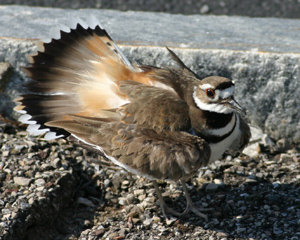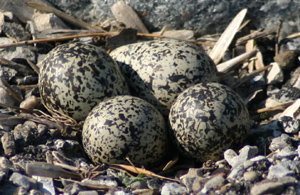Killdeer Charadrius vociferus
The Killdeer (Charadrius vociferus) is a medium-sized plover.
Description: Adults have a brown back and wings, a white belly, and a white breast with two black bands. The rump is tawny orange. The face and cap are brown with a white forehead. They have an orange-red eyering. Tail extends beyond wing tips at rest. Sexes are similar in appearance. The chicks are  patterned almost identically to the adults, and are precocial — able to move around right after hatching. patterned almost identically to the adults, and are precocial — able to move around right after hatching.
Their breeding habitat is open fields or lawns, often quite far from water, across most of Canada, the United States, and Mexico. They nest on the ground in an open area with a clear line of sight, or on a gravel roof.
They are migratory in northern areas and winter as far south as northern South America. They are rare vagrants to western Europe, usually late in the year.
These birds forage for food in fields, mudflats, and shores, usually by sight. They mainly eat insects.
Their name comes from their frequently heard call.
These birds will frequently use the "broken-wing act" to distract predators from their nests. This involves the bird walking away from its nesting area holding its wing in a position that simulates an injury and then flapping around on the ground emitting a distress call. The predators then think they have easy prey and are attracted to this seemingly injured bird and away from the nest. Killdeer have an average length of 8 inches 
Similar species - all other plovers lack the two black breastbands. Very young Killdeer have a single breastband and could be confused with Piping, Wilson's, Snowy or Semipalmated Plovers, but are usually still downy, have black bills (any Piping or Semipalmated Plover having a breastband will also have an orange bill with a black tip), and are colored above like the adult (eliminating the paler Piping and Snowy).
Killdeer Charadrius vociferus - USGS Patuxent Bird Identification InfoCenter
|


 patterned almost identically to the adults, and are precocial — able to move around right after hatching.
patterned almost identically to the adults, and are precocial — able to move around right after hatching.